Developing Manager Report: Management Styles, Leadership, and Skills
VerifiedAdded on 2020/11/12
|22
|7179
|428
Report
AI Summary
This report delves into the multifaceted aspects of developing a manager, exploring various management styles, leadership characteristics, and motivational theories through a comparative analysis of Hilton and Marriott Hotels. It examines communication processes, organizational culture, and structure within these hospitality giants. The report further includes a self-knowledge and appraisal section, evaluating individual potential and managerial skills, complemented by a SWOT analysis. Finally, it culminates in a career development plan, outlining strategies for employee growth and aligning with the present and future needs of an organization. The report covers topics like management styles (autocratic vs. democratic), classical and systems approaches to management, leadership approaches, motivational theories (Maslow's and Herzberg's), conflict resolution strategies, the roles of partnerships and stakeholders, and the communication process. The report also includes a discussion on how managerial and personal skills contribute to career advancement and concludes with a comprehensive development plan.
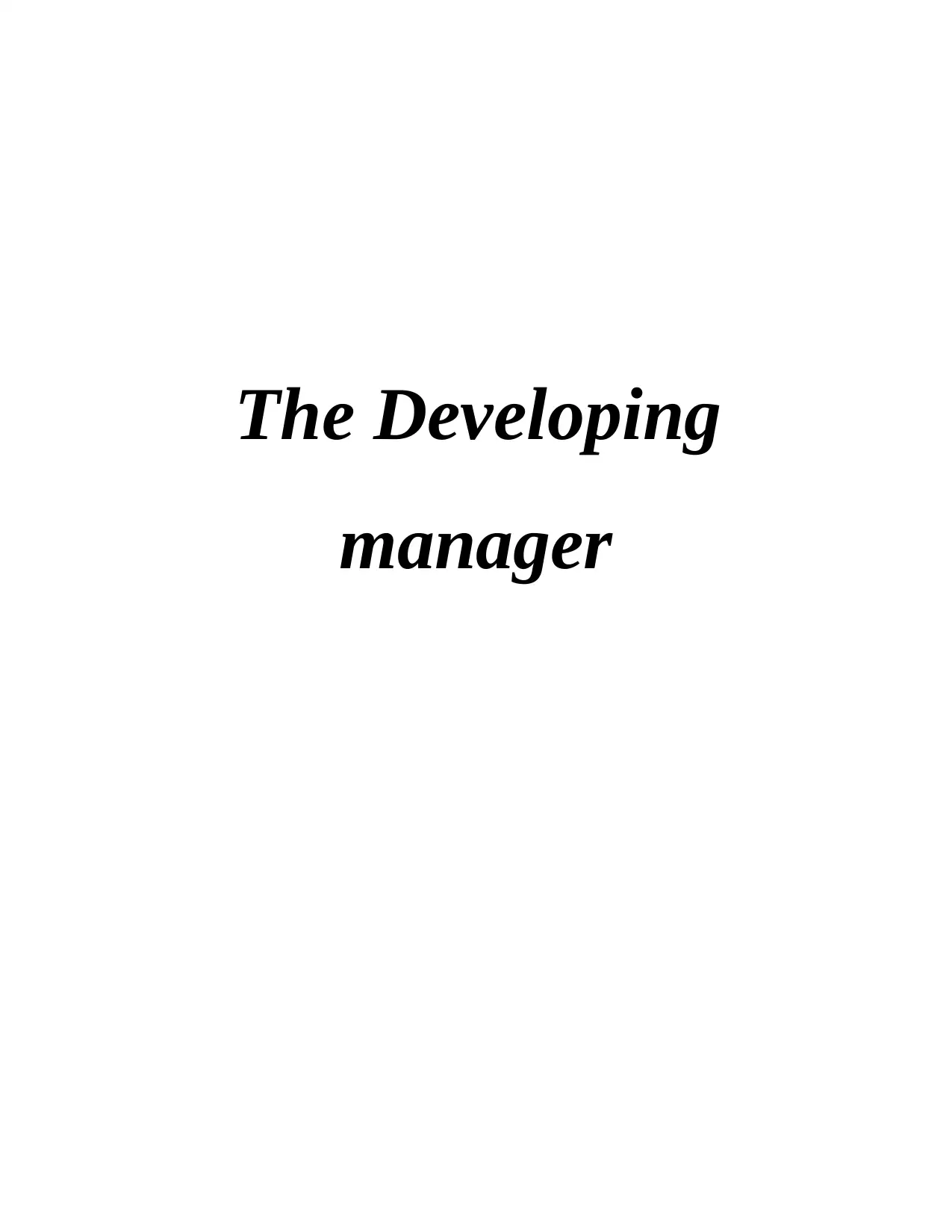
The Developing
manager
manager
Paraphrase This Document
Need a fresh take? Get an instant paraphrase of this document with our AI Paraphraser
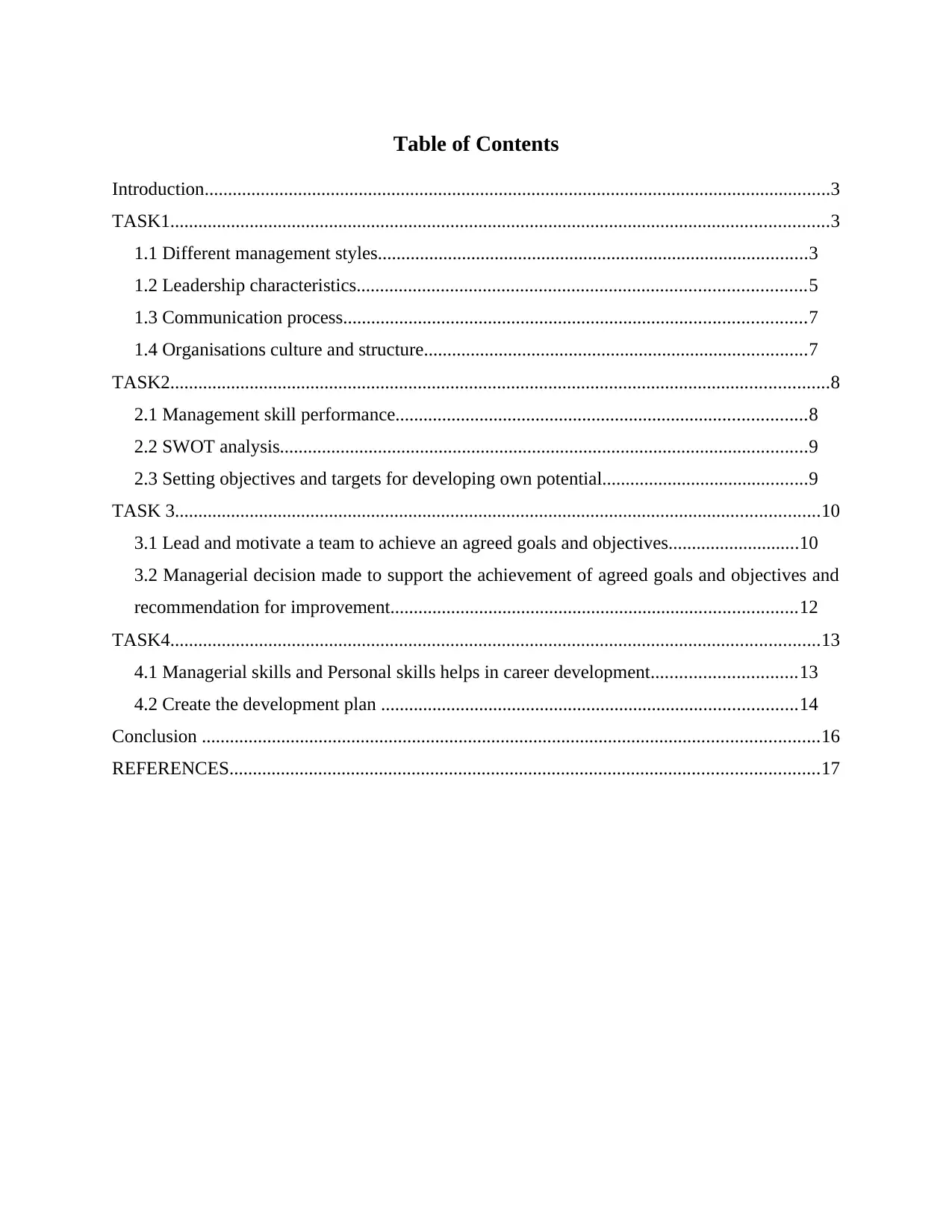
Table of Contents
Introduction......................................................................................................................................3
TASK1.............................................................................................................................................3
1.1 Different management styles............................................................................................3
1.2 Leadership characteristics................................................................................................5
1.3 Communication process...................................................................................................7
1.4 Organisations culture and structure..................................................................................7
TASK2.............................................................................................................................................8
2.1 Management skill performance........................................................................................8
2.2 SWOT analysis.................................................................................................................9
2.3 Setting objectives and targets for developing own potential............................................9
TASK 3..........................................................................................................................................10
3.1 Lead and motivate a team to achieve an agreed goals and objectives............................10
3.2 Managerial decision made to support the achievement of agreed goals and objectives and
recommendation for improvement.......................................................................................12
TASK4...........................................................................................................................................13
4.1 Managerial skills and Personal skills helps in career development...............................13
4.2 Create the development plan .........................................................................................14
Conclusion ....................................................................................................................................16
REFERENCES..............................................................................................................................17
Introduction......................................................................................................................................3
TASK1.............................................................................................................................................3
1.1 Different management styles............................................................................................3
1.2 Leadership characteristics................................................................................................5
1.3 Communication process...................................................................................................7
1.4 Organisations culture and structure..................................................................................7
TASK2.............................................................................................................................................8
2.1 Management skill performance........................................................................................8
2.2 SWOT analysis.................................................................................................................9
2.3 Setting objectives and targets for developing own potential............................................9
TASK 3..........................................................................................................................................10
3.1 Lead and motivate a team to achieve an agreed goals and objectives............................10
3.2 Managerial decision made to support the achievement of agreed goals and objectives and
recommendation for improvement.......................................................................................12
TASK4...........................................................................................................................................13
4.1 Managerial skills and Personal skills helps in career development...............................13
4.2 Create the development plan .........................................................................................14
Conclusion ....................................................................................................................................16
REFERENCES..............................................................................................................................17
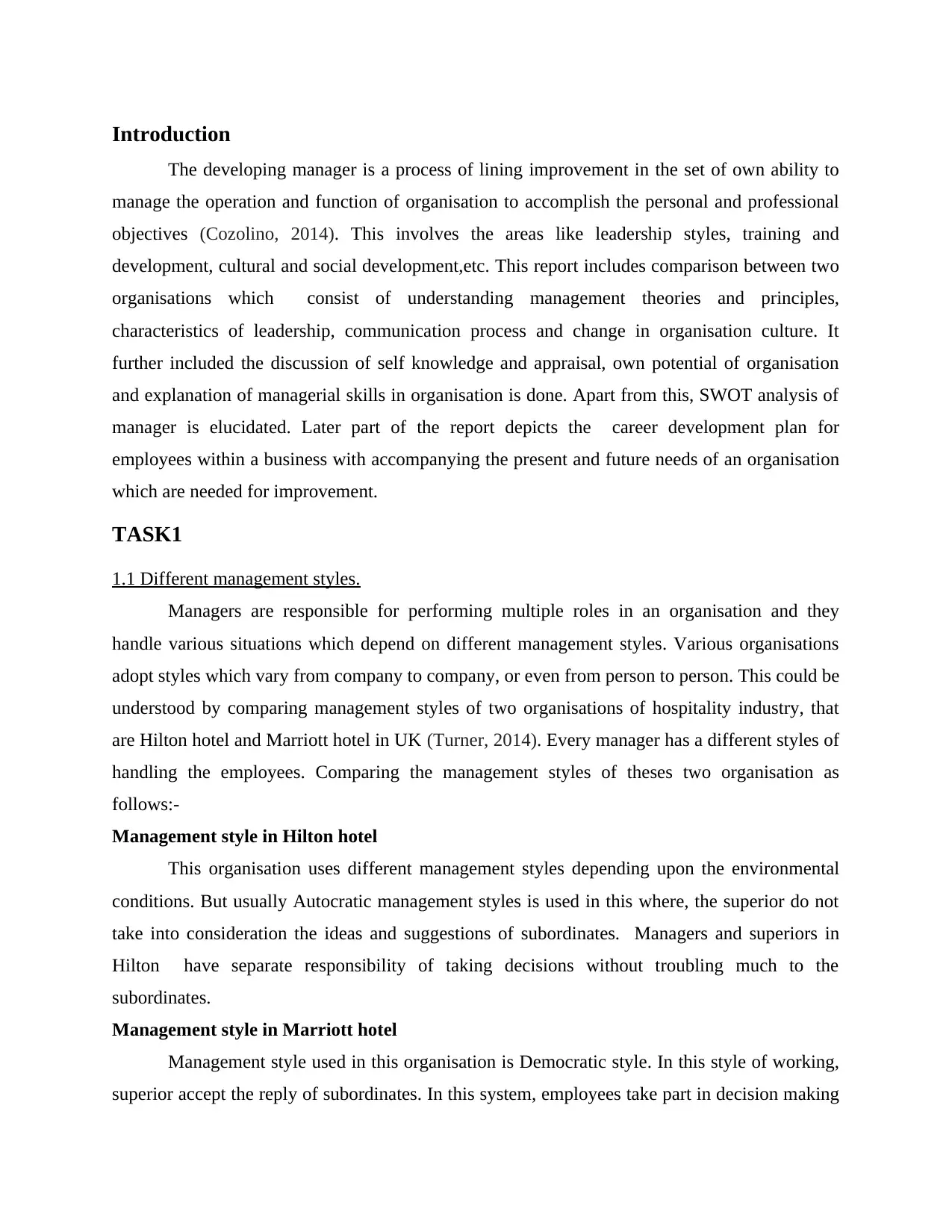
Introduction
The developing manager is a process of lining improvement in the set of own ability to
manage the operation and function of organisation to accomplish the personal and professional
objectives (Cozolino, 2014). This involves the areas like leadership styles, training and
development, cultural and social development,etc. This report includes comparison between two
organisations which consist of understanding management theories and principles,
characteristics of leadership, communication process and change in organisation culture. It
further included the discussion of self knowledge and appraisal, own potential of organisation
and explanation of managerial skills in organisation is done. Apart from this, SWOT analysis of
manager is elucidated. Later part of the report depicts the career development plan for
employees within a business with accompanying the present and future needs of an organisation
which are needed for improvement.
TASK1
1.1 Different management styles.
Managers are responsible for performing multiple roles in an organisation and they
handle various situations which depend on different management styles. Various organisations
adopt styles which vary from company to company, or even from person to person. This could be
understood by comparing management styles of two organisations of hospitality industry, that
are Hilton hotel and Marriott hotel in UK (Turner, 2014). Every manager has a different styles of
handling the employees. Comparing the management styles of theses two organisation as
follows:-
Management style in Hilton hotel
This organisation uses different management styles depending upon the environmental
conditions. But usually Autocratic management styles is used in this where, the superior do not
take into consideration the ideas and suggestions of subordinates. Managers and superiors in
Hilton have separate responsibility of taking decisions without troubling much to the
subordinates.
Management style in Marriott hotel
Management style used in this organisation is Democratic style. In this style of working,
superior accept the reply of subordinates. In this system, employees take part in decision making
The developing manager is a process of lining improvement in the set of own ability to
manage the operation and function of organisation to accomplish the personal and professional
objectives (Cozolino, 2014). This involves the areas like leadership styles, training and
development, cultural and social development,etc. This report includes comparison between two
organisations which consist of understanding management theories and principles,
characteristics of leadership, communication process and change in organisation culture. It
further included the discussion of self knowledge and appraisal, own potential of organisation
and explanation of managerial skills in organisation is done. Apart from this, SWOT analysis of
manager is elucidated. Later part of the report depicts the career development plan for
employees within a business with accompanying the present and future needs of an organisation
which are needed for improvement.
TASK1
1.1 Different management styles.
Managers are responsible for performing multiple roles in an organisation and they
handle various situations which depend on different management styles. Various organisations
adopt styles which vary from company to company, or even from person to person. This could be
understood by comparing management styles of two organisations of hospitality industry, that
are Hilton hotel and Marriott hotel in UK (Turner, 2014). Every manager has a different styles of
handling the employees. Comparing the management styles of theses two organisation as
follows:-
Management style in Hilton hotel
This organisation uses different management styles depending upon the environmental
conditions. But usually Autocratic management styles is used in this where, the superior do not
take into consideration the ideas and suggestions of subordinates. Managers and superiors in
Hilton have separate responsibility of taking decisions without troubling much to the
subordinates.
Management style in Marriott hotel
Management style used in this organisation is Democratic style. In this style of working,
superior accept the reply of subordinates. In this system, employees take part in decision making
⊘ This is a preview!⊘
Do you want full access?
Subscribe today to unlock all pages.

Trusted by 1+ million students worldwide
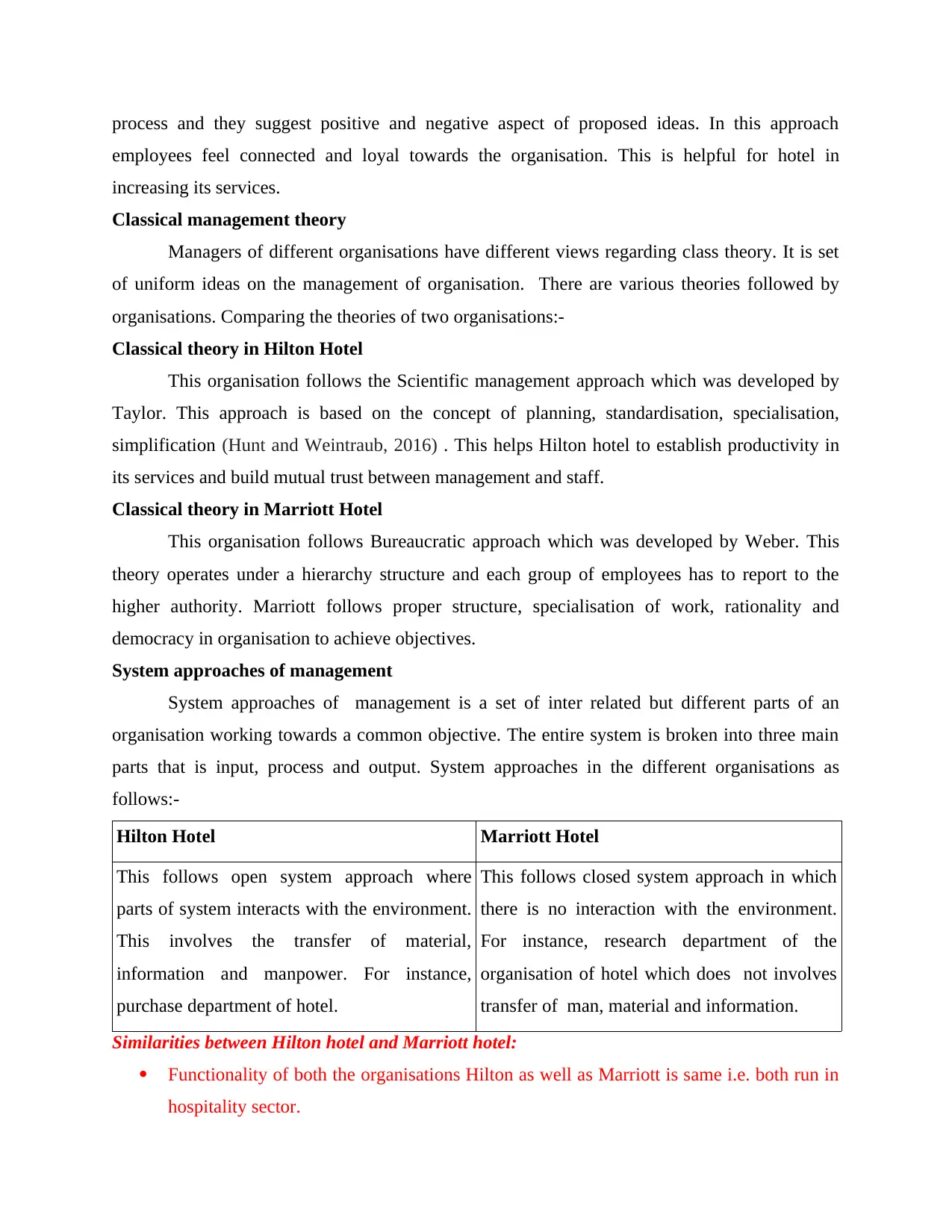
process and they suggest positive and negative aspect of proposed ideas. In this approach
employees feel connected and loyal towards the organisation. This is helpful for hotel in
increasing its services.
Classical management theory
Managers of different organisations have different views regarding class theory. It is set
of uniform ideas on the management of organisation. There are various theories followed by
organisations. Comparing the theories of two organisations:-
Classical theory in Hilton Hotel
This organisation follows the Scientific management approach which was developed by
Taylor. This approach is based on the concept of planning, standardisation, specialisation,
simplification (Hunt and Weintraub, 2016) . This helps Hilton hotel to establish productivity in
its services and build mutual trust between management and staff.
Classical theory in Marriott Hotel
This organisation follows Bureaucratic approach which was developed by Weber. This
theory operates under a hierarchy structure and each group of employees has to report to the
higher authority. Marriott follows proper structure, specialisation of work, rationality and
democracy in organisation to achieve objectives.
System approaches of management
System approaches of management is a set of inter related but different parts of an
organisation working towards a common objective. The entire system is broken into three main
parts that is input, process and output. System approaches in the different organisations as
follows:-
Hilton Hotel Marriott Hotel
This follows open system approach where
parts of system interacts with the environment.
This involves the transfer of material,
information and manpower. For instance,
purchase department of hotel.
This follows closed system approach in which
there is no interaction with the environment.
For instance, research department of the
organisation of hotel which does not involves
transfer of man, material and information.
Similarities between Hilton hotel and Marriott hotel:
Functionality of both the organisations Hilton as well as Marriott is same i.e. both run in
hospitality sector.
employees feel connected and loyal towards the organisation. This is helpful for hotel in
increasing its services.
Classical management theory
Managers of different organisations have different views regarding class theory. It is set
of uniform ideas on the management of organisation. There are various theories followed by
organisations. Comparing the theories of two organisations:-
Classical theory in Hilton Hotel
This organisation follows the Scientific management approach which was developed by
Taylor. This approach is based on the concept of planning, standardisation, specialisation,
simplification (Hunt and Weintraub, 2016) . This helps Hilton hotel to establish productivity in
its services and build mutual trust between management and staff.
Classical theory in Marriott Hotel
This organisation follows Bureaucratic approach which was developed by Weber. This
theory operates under a hierarchy structure and each group of employees has to report to the
higher authority. Marriott follows proper structure, specialisation of work, rationality and
democracy in organisation to achieve objectives.
System approaches of management
System approaches of management is a set of inter related but different parts of an
organisation working towards a common objective. The entire system is broken into three main
parts that is input, process and output. System approaches in the different organisations as
follows:-
Hilton Hotel Marriott Hotel
This follows open system approach where
parts of system interacts with the environment.
This involves the transfer of material,
information and manpower. For instance,
purchase department of hotel.
This follows closed system approach in which
there is no interaction with the environment.
For instance, research department of the
organisation of hotel which does not involves
transfer of man, material and information.
Similarities between Hilton hotel and Marriott hotel:
Functionality of both the organisations Hilton as well as Marriott is same i.e. both run in
hospitality sector.
Paraphrase This Document
Need a fresh take? Get an instant paraphrase of this document with our AI Paraphraser
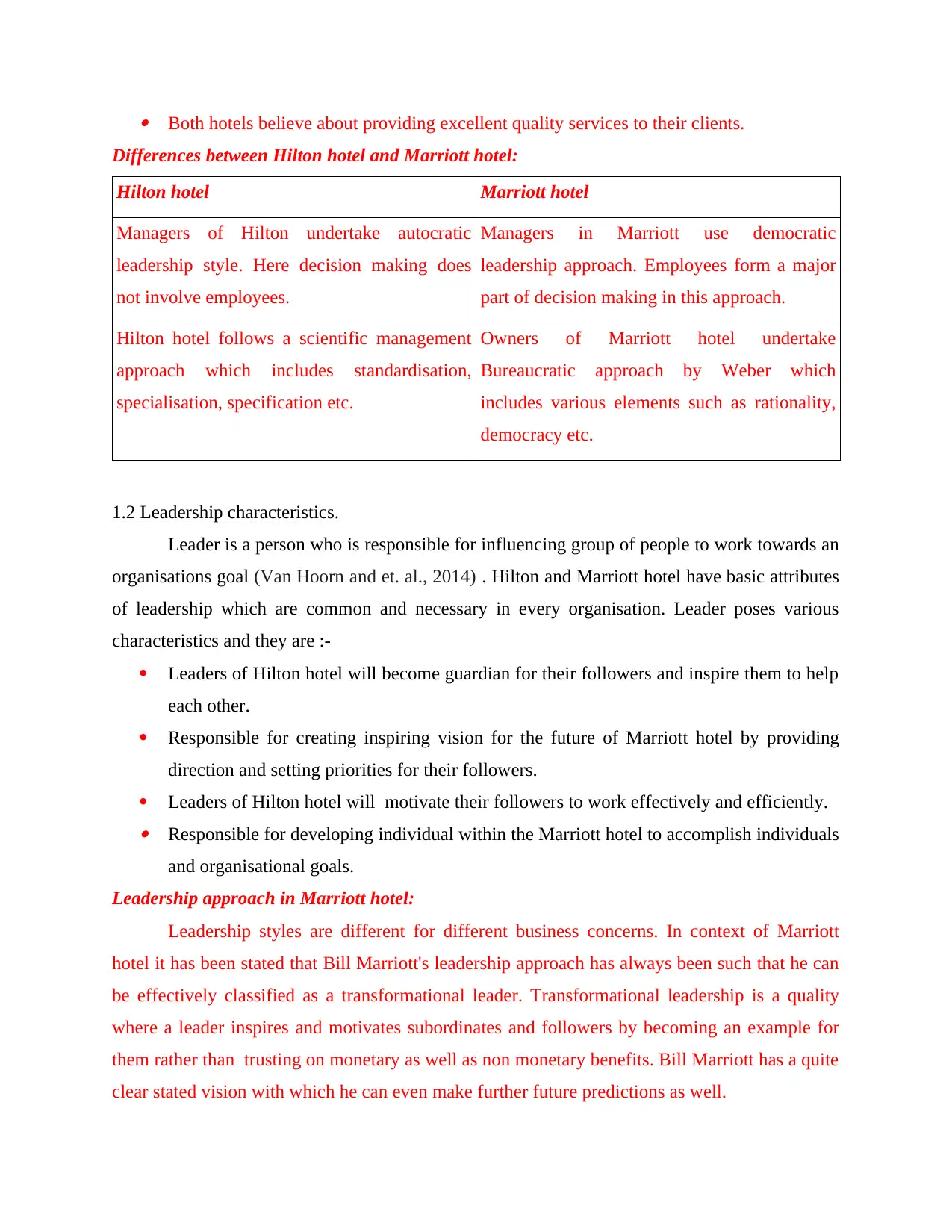
Both hotels believe about providing excellent quality services to their clients.
Differences between Hilton hotel and Marriott hotel:
Hilton hotel Marriott hotel
Managers of Hilton undertake autocratic
leadership style. Here decision making does
not involve employees.
Managers in Marriott use democratic
leadership approach. Employees form a major
part of decision making in this approach.
Hilton hotel follows a scientific management
approach which includes standardisation,
specialisation, specification etc.
Owners of Marriott hotel undertake
Bureaucratic approach by Weber which
includes various elements such as rationality,
democracy etc.
1.2 Leadership characteristics.
Leader is a person who is responsible for influencing group of people to work towards an
organisations goal (Van Hoorn and et. al., 2014) . Hilton and Marriott hotel have basic attributes
of leadership which are common and necessary in every organisation. Leader poses various
characteristics and they are :-
Leaders of Hilton hotel will become guardian for their followers and inspire them to help
each other.
Responsible for creating inspiring vision for the future of Marriott hotel by providing
direction and setting priorities for their followers.
Leaders of Hilton hotel will motivate their followers to work effectively and efficiently. Responsible for developing individual within the Marriott hotel to accomplish individuals
and organisational goals.
Leadership approach in Marriott hotel:
Leadership styles are different for different business concerns. In context of Marriott
hotel it has been stated that Bill Marriott's leadership approach has always been such that he can
be effectively classified as a transformational leader. Transformational leadership is a quality
where a leader inspires and motivates subordinates and followers by becoming an example for
them rather than trusting on monetary as well as non monetary benefits. Bill Marriott has a quite
clear stated vision with which he can even make further future predictions as well.
Differences between Hilton hotel and Marriott hotel:
Hilton hotel Marriott hotel
Managers of Hilton undertake autocratic
leadership style. Here decision making does
not involve employees.
Managers in Marriott use democratic
leadership approach. Employees form a major
part of decision making in this approach.
Hilton hotel follows a scientific management
approach which includes standardisation,
specialisation, specification etc.
Owners of Marriott hotel undertake
Bureaucratic approach by Weber which
includes various elements such as rationality,
democracy etc.
1.2 Leadership characteristics.
Leader is a person who is responsible for influencing group of people to work towards an
organisations goal (Van Hoorn and et. al., 2014) . Hilton and Marriott hotel have basic attributes
of leadership which are common and necessary in every organisation. Leader poses various
characteristics and they are :-
Leaders of Hilton hotel will become guardian for their followers and inspire them to help
each other.
Responsible for creating inspiring vision for the future of Marriott hotel by providing
direction and setting priorities for their followers.
Leaders of Hilton hotel will motivate their followers to work effectively and efficiently. Responsible for developing individual within the Marriott hotel to accomplish individuals
and organisational goals.
Leadership approach in Marriott hotel:
Leadership styles are different for different business concerns. In context of Marriott
hotel it has been stated that Bill Marriott's leadership approach has always been such that he can
be effectively classified as a transformational leader. Transformational leadership is a quality
where a leader inspires and motivates subordinates and followers by becoming an example for
them rather than trusting on monetary as well as non monetary benefits. Bill Marriott has a quite
clear stated vision with which he can even make further future predictions as well.
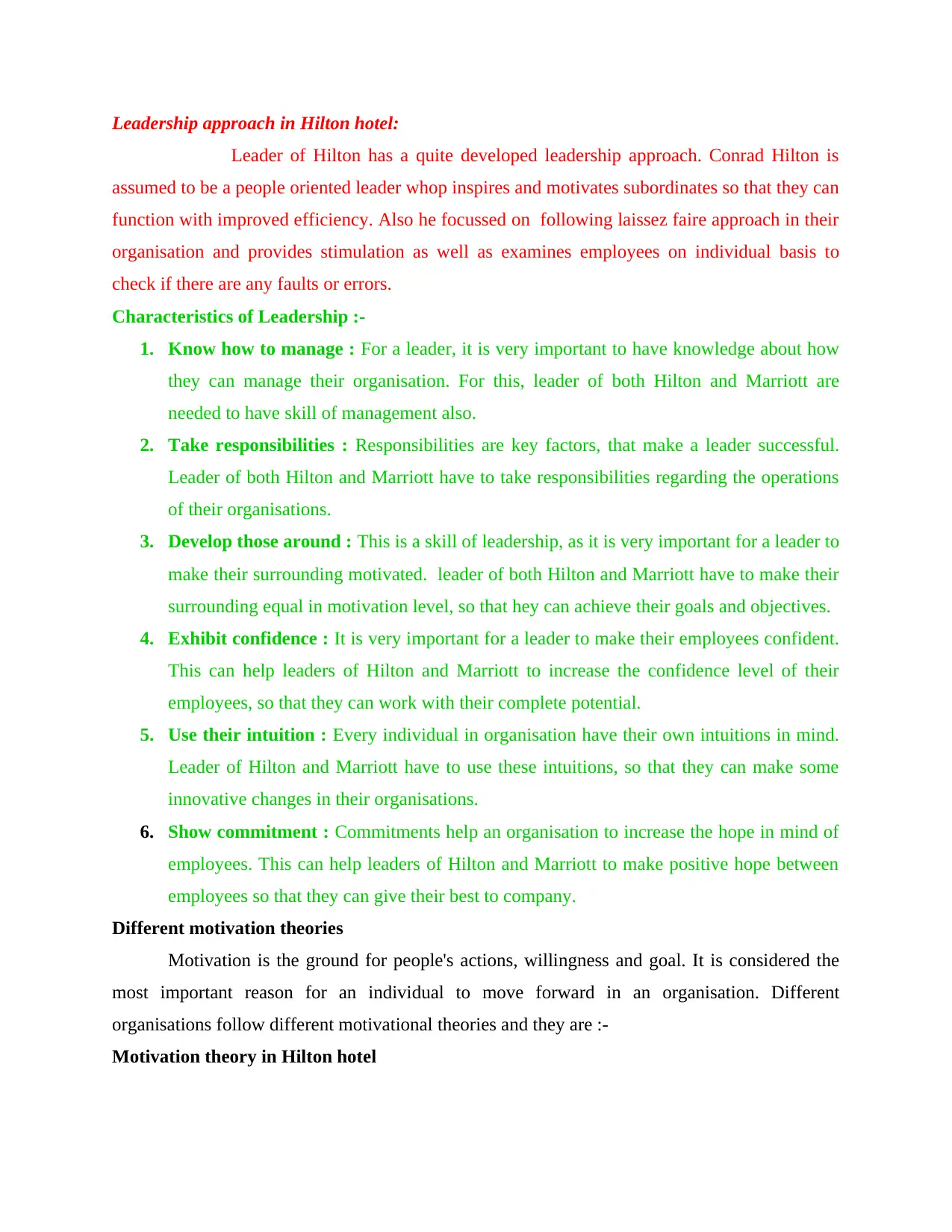
Leadership approach in Hilton hotel:
Leader of Hilton has a quite developed leadership approach. Conrad Hilton is
assumed to be a people oriented leader whop inspires and motivates subordinates so that they can
function with improved efficiency. Also he focussed on following laissez faire approach in their
organisation and provides stimulation as well as examines employees on individual basis to
check if there are any faults or errors.
Characteristics of Leadership :-
1. Know how to manage : For a leader, it is very important to have knowledge about how
they can manage their organisation. For this, leader of both Hilton and Marriott are
needed to have skill of management also.
2. Take responsibilities : Responsibilities are key factors, that make a leader successful.
Leader of both Hilton and Marriott have to take responsibilities regarding the operations
of their organisations.
3. Develop those around : This is a skill of leadership, as it is very important for a leader to
make their surrounding motivated. leader of both Hilton and Marriott have to make their
surrounding equal in motivation level, so that hey can achieve their goals and objectives.
4. Exhibit confidence : It is very important for a leader to make their employees confident.
This can help leaders of Hilton and Marriott to increase the confidence level of their
employees, so that they can work with their complete potential.
5. Use their intuition : Every individual in organisation have their own intuitions in mind.
Leader of Hilton and Marriott have to use these intuitions, so that they can make some
innovative changes in their organisations.
6. Show commitment : Commitments help an organisation to increase the hope in mind of
employees. This can help leaders of Hilton and Marriott to make positive hope between
employees so that they can give their best to company.
Different motivation theories
Motivation is the ground for people's actions, willingness and goal. It is considered the
most important reason for an individual to move forward in an organisation. Different
organisations follow different motivational theories and they are :-
Motivation theory in Hilton hotel
Leader of Hilton has a quite developed leadership approach. Conrad Hilton is
assumed to be a people oriented leader whop inspires and motivates subordinates so that they can
function with improved efficiency. Also he focussed on following laissez faire approach in their
organisation and provides stimulation as well as examines employees on individual basis to
check if there are any faults or errors.
Characteristics of Leadership :-
1. Know how to manage : For a leader, it is very important to have knowledge about how
they can manage their organisation. For this, leader of both Hilton and Marriott are
needed to have skill of management also.
2. Take responsibilities : Responsibilities are key factors, that make a leader successful.
Leader of both Hilton and Marriott have to take responsibilities regarding the operations
of their organisations.
3. Develop those around : This is a skill of leadership, as it is very important for a leader to
make their surrounding motivated. leader of both Hilton and Marriott have to make their
surrounding equal in motivation level, so that hey can achieve their goals and objectives.
4. Exhibit confidence : It is very important for a leader to make their employees confident.
This can help leaders of Hilton and Marriott to increase the confidence level of their
employees, so that they can work with their complete potential.
5. Use their intuition : Every individual in organisation have their own intuitions in mind.
Leader of Hilton and Marriott have to use these intuitions, so that they can make some
innovative changes in their organisations.
6. Show commitment : Commitments help an organisation to increase the hope in mind of
employees. This can help leaders of Hilton and Marriott to make positive hope between
employees so that they can give their best to company.
Different motivation theories
Motivation is the ground for people's actions, willingness and goal. It is considered the
most important reason for an individual to move forward in an organisation. Different
organisations follow different motivational theories and they are :-
Motivation theory in Hilton hotel
⊘ This is a preview!⊘
Do you want full access?
Subscribe today to unlock all pages.

Trusted by 1+ million students worldwide
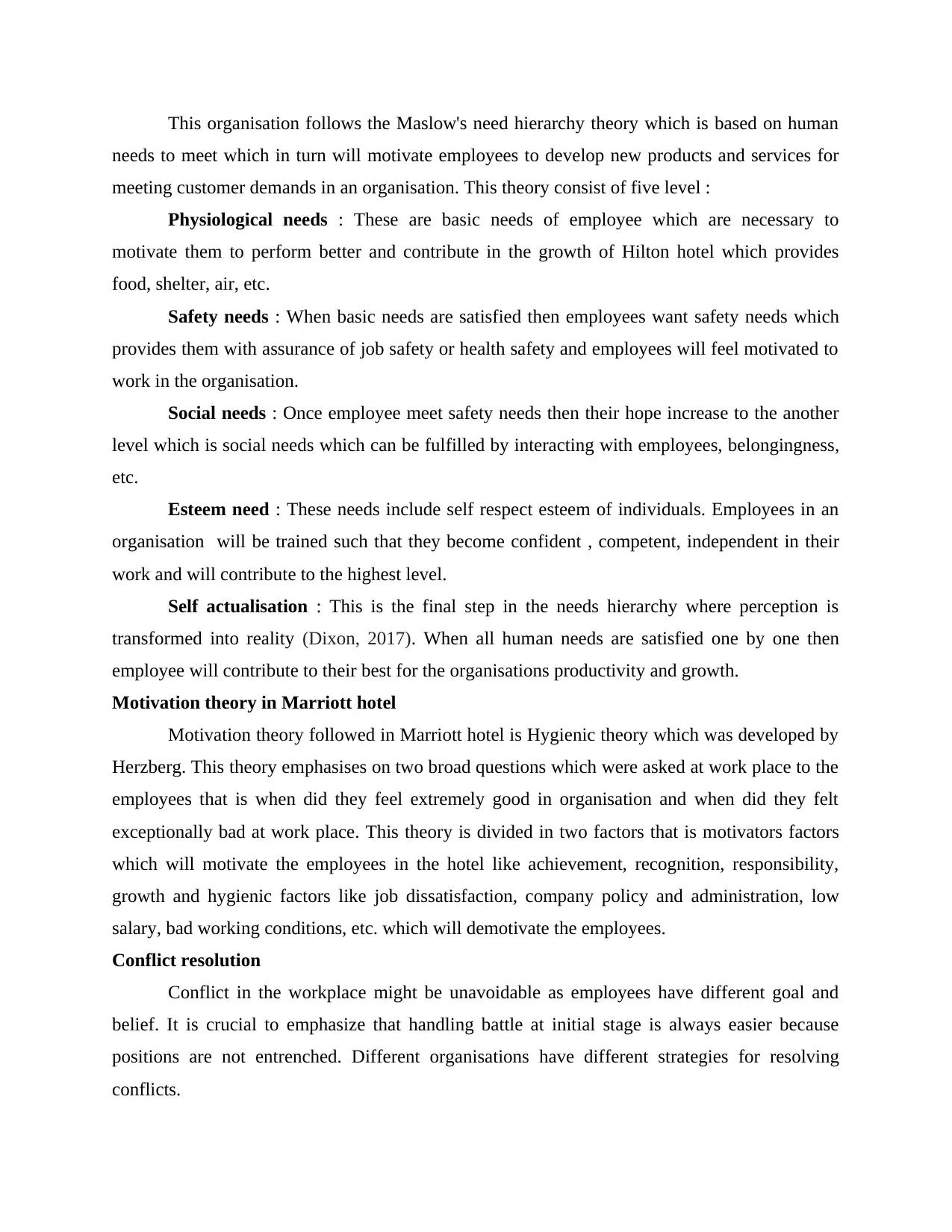
This organisation follows the Maslow's need hierarchy theory which is based on human
needs to meet which in turn will motivate employees to develop new products and services for
meeting customer demands in an organisation. This theory consist of five level :
Physiological needs : These are basic needs of employee which are necessary to
motivate them to perform better and contribute in the growth of Hilton hotel which provides
food, shelter, air, etc.
Safety needs : When basic needs are satisfied then employees want safety needs which
provides them with assurance of job safety or health safety and employees will feel motivated to
work in the organisation.
Social needs : Once employee meet safety needs then their hope increase to the another
level which is social needs which can be fulfilled by interacting with employees, belongingness,
etc.
Esteem need : These needs include self respect esteem of individuals. Employees in an
organisation will be trained such that they become confident , competent, independent in their
work and will contribute to the highest level.
Self actualisation : This is the final step in the needs hierarchy where perception is
transformed into reality (Dixon, 2017). When all human needs are satisfied one by one then
employee will contribute to their best for the organisations productivity and growth.
Motivation theory in Marriott hotel
Motivation theory followed in Marriott hotel is Hygienic theory which was developed by
Herzberg. This theory emphasises on two broad questions which were asked at work place to the
employees that is when did they feel extremely good in organisation and when did they felt
exceptionally bad at work place. This theory is divided in two factors that is motivators factors
which will motivate the employees in the hotel like achievement, recognition, responsibility,
growth and hygienic factors like job dissatisfaction, company policy and administration, low
salary, bad working conditions, etc. which will demotivate the employees.
Conflict resolution
Conflict in the workplace might be unavoidable as employees have different goal and
belief. It is crucial to emphasize that handling battle at initial stage is always easier because
positions are not entrenched. Different organisations have different strategies for resolving
conflicts.
needs to meet which in turn will motivate employees to develop new products and services for
meeting customer demands in an organisation. This theory consist of five level :
Physiological needs : These are basic needs of employee which are necessary to
motivate them to perform better and contribute in the growth of Hilton hotel which provides
food, shelter, air, etc.
Safety needs : When basic needs are satisfied then employees want safety needs which
provides them with assurance of job safety or health safety and employees will feel motivated to
work in the organisation.
Social needs : Once employee meet safety needs then their hope increase to the another
level which is social needs which can be fulfilled by interacting with employees, belongingness,
etc.
Esteem need : These needs include self respect esteem of individuals. Employees in an
organisation will be trained such that they become confident , competent, independent in their
work and will contribute to the highest level.
Self actualisation : This is the final step in the needs hierarchy where perception is
transformed into reality (Dixon, 2017). When all human needs are satisfied one by one then
employee will contribute to their best for the organisations productivity and growth.
Motivation theory in Marriott hotel
Motivation theory followed in Marriott hotel is Hygienic theory which was developed by
Herzberg. This theory emphasises on two broad questions which were asked at work place to the
employees that is when did they feel extremely good in organisation and when did they felt
exceptionally bad at work place. This theory is divided in two factors that is motivators factors
which will motivate the employees in the hotel like achievement, recognition, responsibility,
growth and hygienic factors like job dissatisfaction, company policy and administration, low
salary, bad working conditions, etc. which will demotivate the employees.
Conflict resolution
Conflict in the workplace might be unavoidable as employees have different goal and
belief. It is crucial to emphasize that handling battle at initial stage is always easier because
positions are not entrenched. Different organisations have different strategies for resolving
conflicts.
Paraphrase This Document
Need a fresh take? Get an instant paraphrase of this document with our AI Paraphraser
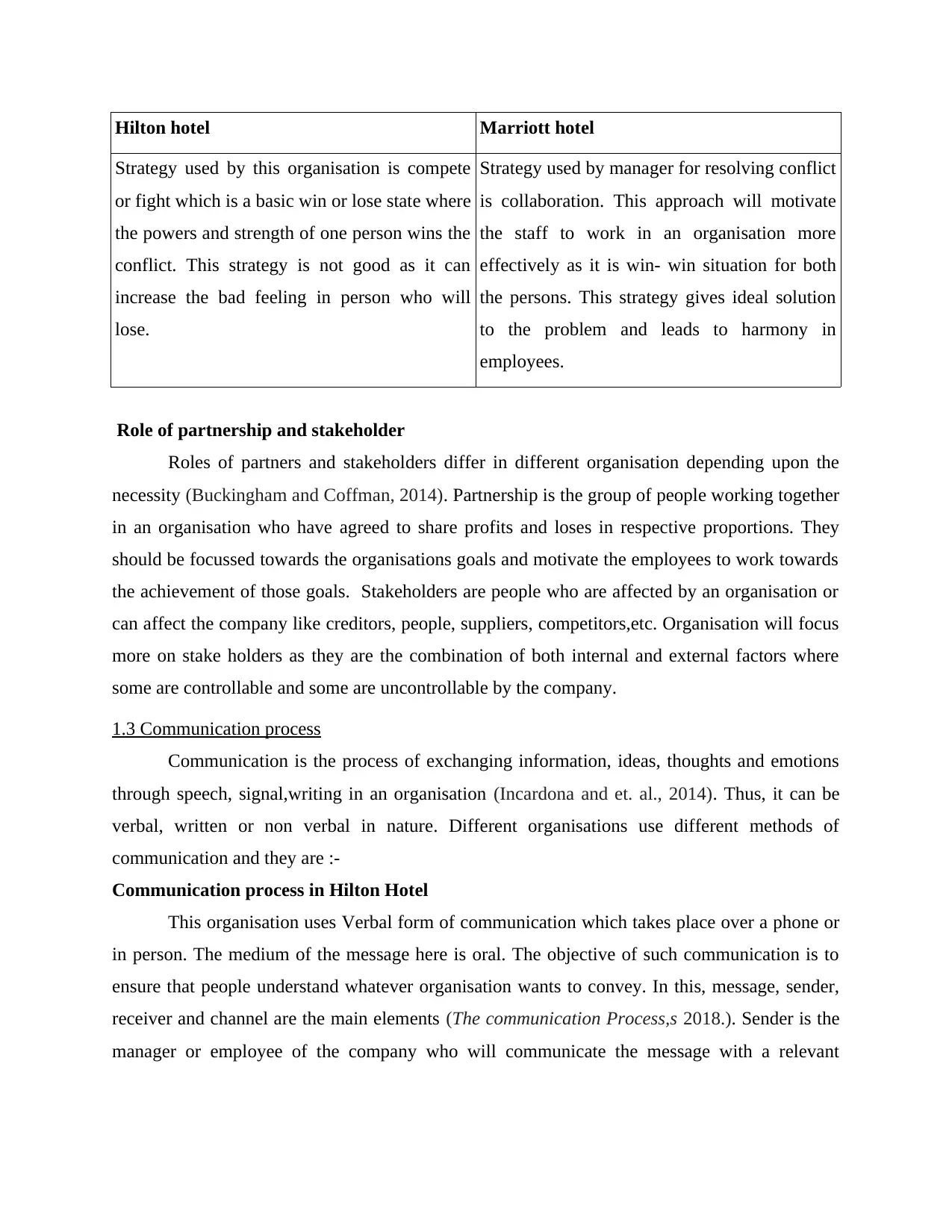
Hilton hotel Marriott hotel
Strategy used by this organisation is compete
or fight which is a basic win or lose state where
the powers and strength of one person wins the
conflict. This strategy is not good as it can
increase the bad feeling in person who will
lose.
Strategy used by manager for resolving conflict
is collaboration. This approach will motivate
the staff to work in an organisation more
effectively as it is win- win situation for both
the persons. This strategy gives ideal solution
to the problem and leads to harmony in
employees.
Role of partnership and stakeholder
Roles of partners and stakeholders differ in different organisation depending upon the
necessity (Buckingham and Coffman, 2014). Partnership is the group of people working together
in an organisation who have agreed to share profits and loses in respective proportions. They
should be focussed towards the organisations goals and motivate the employees to work towards
the achievement of those goals. Stakeholders are people who are affected by an organisation or
can affect the company like creditors, people, suppliers, competitors,etc. Organisation will focus
more on stake holders as they are the combination of both internal and external factors where
some are controllable and some are uncontrollable by the company.
1.3 Communication process
Communication is the process of exchanging information, ideas, thoughts and emotions
through speech, signal,writing in an organisation (Incardona and et. al., 2014). Thus, it can be
verbal, written or non verbal in nature. Different organisations use different methods of
communication and they are :-
Communication process in Hilton Hotel
This organisation uses Verbal form of communication which takes place over a phone or
in person. The medium of the message here is oral. The objective of such communication is to
ensure that people understand whatever organisation wants to convey. In this, message, sender,
receiver and channel are the main elements (The communication Process,s 2018.). Sender is the
manager or employee of the company who will communicate the message with a relevant
Strategy used by this organisation is compete
or fight which is a basic win or lose state where
the powers and strength of one person wins the
conflict. This strategy is not good as it can
increase the bad feeling in person who will
lose.
Strategy used by manager for resolving conflict
is collaboration. This approach will motivate
the staff to work in an organisation more
effectively as it is win- win situation for both
the persons. This strategy gives ideal solution
to the problem and leads to harmony in
employees.
Role of partnership and stakeholder
Roles of partners and stakeholders differ in different organisation depending upon the
necessity (Buckingham and Coffman, 2014). Partnership is the group of people working together
in an organisation who have agreed to share profits and loses in respective proportions. They
should be focussed towards the organisations goals and motivate the employees to work towards
the achievement of those goals. Stakeholders are people who are affected by an organisation or
can affect the company like creditors, people, suppliers, competitors,etc. Organisation will focus
more on stake holders as they are the combination of both internal and external factors where
some are controllable and some are uncontrollable by the company.
1.3 Communication process
Communication is the process of exchanging information, ideas, thoughts and emotions
through speech, signal,writing in an organisation (Incardona and et. al., 2014). Thus, it can be
verbal, written or non verbal in nature. Different organisations use different methods of
communication and they are :-
Communication process in Hilton Hotel
This organisation uses Verbal form of communication which takes place over a phone or
in person. The medium of the message here is oral. The objective of such communication is to
ensure that people understand whatever organisation wants to convey. In this, message, sender,
receiver and channel are the main elements (The communication Process,s 2018.). Sender is the
manager or employee of the company who will communicate the message with a relevant
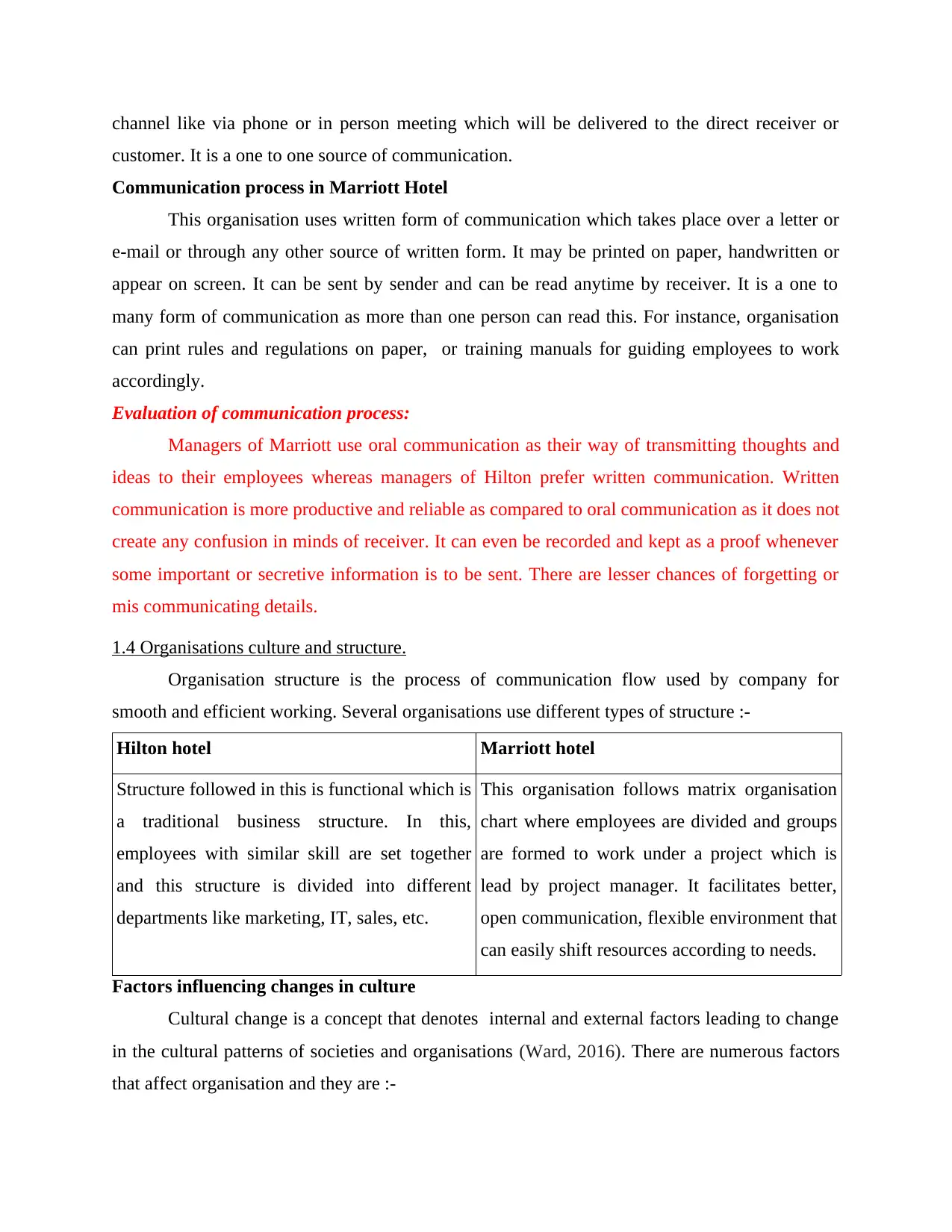
channel like via phone or in person meeting which will be delivered to the direct receiver or
customer. It is a one to one source of communication.
Communication process in Marriott Hotel
This organisation uses written form of communication which takes place over a letter or
e-mail or through any other source of written form. It may be printed on paper, handwritten or
appear on screen. It can be sent by sender and can be read anytime by receiver. It is a one to
many form of communication as more than one person can read this. For instance, organisation
can print rules and regulations on paper, or training manuals for guiding employees to work
accordingly.
Evaluation of communication process:
Managers of Marriott use oral communication as their way of transmitting thoughts and
ideas to their employees whereas managers of Hilton prefer written communication. Written
communication is more productive and reliable as compared to oral communication as it does not
create any confusion in minds of receiver. It can even be recorded and kept as a proof whenever
some important or secretive information is to be sent. There are lesser chances of forgetting or
mis communicating details.
1.4 Organisations culture and structure.
Organisation structure is the process of communication flow used by company for
smooth and efficient working. Several organisations use different types of structure :-
Hilton hotel Marriott hotel
Structure followed in this is functional which is
a traditional business structure. In this,
employees with similar skill are set together
and this structure is divided into different
departments like marketing, IT, sales, etc.
This organisation follows matrix organisation
chart where employees are divided and groups
are formed to work under a project which is
lead by project manager. It facilitates better,
open communication, flexible environment that
can easily shift resources according to needs.
Factors influencing changes in culture
Cultural change is a concept that denotes internal and external factors leading to change
in the cultural patterns of societies and organisations (Ward, 2016). There are numerous factors
that affect organisation and they are :-
customer. It is a one to one source of communication.
Communication process in Marriott Hotel
This organisation uses written form of communication which takes place over a letter or
e-mail or through any other source of written form. It may be printed on paper, handwritten or
appear on screen. It can be sent by sender and can be read anytime by receiver. It is a one to
many form of communication as more than one person can read this. For instance, organisation
can print rules and regulations on paper, or training manuals for guiding employees to work
accordingly.
Evaluation of communication process:
Managers of Marriott use oral communication as their way of transmitting thoughts and
ideas to their employees whereas managers of Hilton prefer written communication. Written
communication is more productive and reliable as compared to oral communication as it does not
create any confusion in minds of receiver. It can even be recorded and kept as a proof whenever
some important or secretive information is to be sent. There are lesser chances of forgetting or
mis communicating details.
1.4 Organisations culture and structure.
Organisation structure is the process of communication flow used by company for
smooth and efficient working. Several organisations use different types of structure :-
Hilton hotel Marriott hotel
Structure followed in this is functional which is
a traditional business structure. In this,
employees with similar skill are set together
and this structure is divided into different
departments like marketing, IT, sales, etc.
This organisation follows matrix organisation
chart where employees are divided and groups
are formed to work under a project which is
lead by project manager. It facilitates better,
open communication, flexible environment that
can easily shift resources according to needs.
Factors influencing changes in culture
Cultural change is a concept that denotes internal and external factors leading to change
in the cultural patterns of societies and organisations (Ward, 2016). There are numerous factors
that affect organisation and they are :-
⊘ This is a preview!⊘
Do you want full access?
Subscribe today to unlock all pages.

Trusted by 1+ million students worldwide
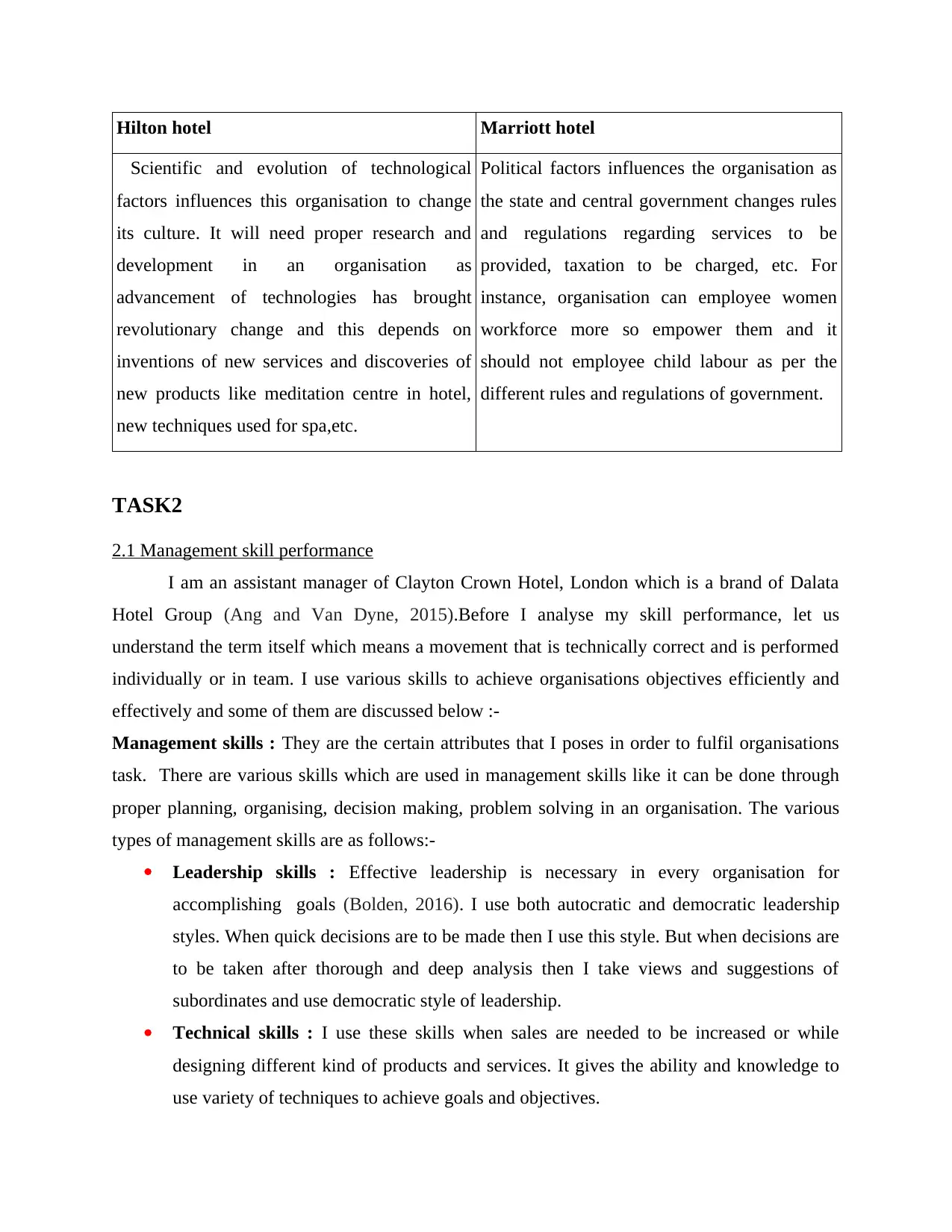
Hilton hotel Marriott hotel
Scientific and evolution of technological
factors influences this organisation to change
its culture. It will need proper research and
development in an organisation as
advancement of technologies has brought
revolutionary change and this depends on
inventions of new services and discoveries of
new products like meditation centre in hotel,
new techniques used for spa,etc.
Political factors influences the organisation as
the state and central government changes rules
and regulations regarding services to be
provided, taxation to be charged, etc. For
instance, organisation can employee women
workforce more so empower them and it
should not employee child labour as per the
different rules and regulations of government.
TASK2
2.1 Management skill performance
I am an assistant manager of Clayton Crown Hotel, London which is a brand of Dalata
Hotel Group (Ang and Van Dyne, 2015).Before I analyse my skill performance, let us
understand the term itself which means a movement that is technically correct and is performed
individually or in team. I use various skills to achieve organisations objectives efficiently and
effectively and some of them are discussed below :-
Management skills : They are the certain attributes that I poses in order to fulfil organisations
task. There are various skills which are used in management skills like it can be done through
proper planning, organising, decision making, problem solving in an organisation. The various
types of management skills are as follows:-
Leadership skills : Effective leadership is necessary in every organisation for
accomplishing goals (Bolden, 2016). I use both autocratic and democratic leadership
styles. When quick decisions are to be made then I use this style. But when decisions are
to be taken after thorough and deep analysis then I take views and suggestions of
subordinates and use democratic style of leadership.
Technical skills : I use these skills when sales are needed to be increased or while
designing different kind of products and services. It gives the ability and knowledge to
use variety of techniques to achieve goals and objectives.
Scientific and evolution of technological
factors influences this organisation to change
its culture. It will need proper research and
development in an organisation as
advancement of technologies has brought
revolutionary change and this depends on
inventions of new services and discoveries of
new products like meditation centre in hotel,
new techniques used for spa,etc.
Political factors influences the organisation as
the state and central government changes rules
and regulations regarding services to be
provided, taxation to be charged, etc. For
instance, organisation can employee women
workforce more so empower them and it
should not employee child labour as per the
different rules and regulations of government.
TASK2
2.1 Management skill performance
I am an assistant manager of Clayton Crown Hotel, London which is a brand of Dalata
Hotel Group (Ang and Van Dyne, 2015).Before I analyse my skill performance, let us
understand the term itself which means a movement that is technically correct and is performed
individually or in team. I use various skills to achieve organisations objectives efficiently and
effectively and some of them are discussed below :-
Management skills : They are the certain attributes that I poses in order to fulfil organisations
task. There are various skills which are used in management skills like it can be done through
proper planning, organising, decision making, problem solving in an organisation. The various
types of management skills are as follows:-
Leadership skills : Effective leadership is necessary in every organisation for
accomplishing goals (Bolden, 2016). I use both autocratic and democratic leadership
styles. When quick decisions are to be made then I use this style. But when decisions are
to be taken after thorough and deep analysis then I take views and suggestions of
subordinates and use democratic style of leadership.
Technical skills : I use these skills when sales are needed to be increased or while
designing different kind of products and services. It gives the ability and knowledge to
use variety of techniques to achieve goals and objectives.
Paraphrase This Document
Need a fresh take? Get an instant paraphrase of this document with our AI Paraphraser
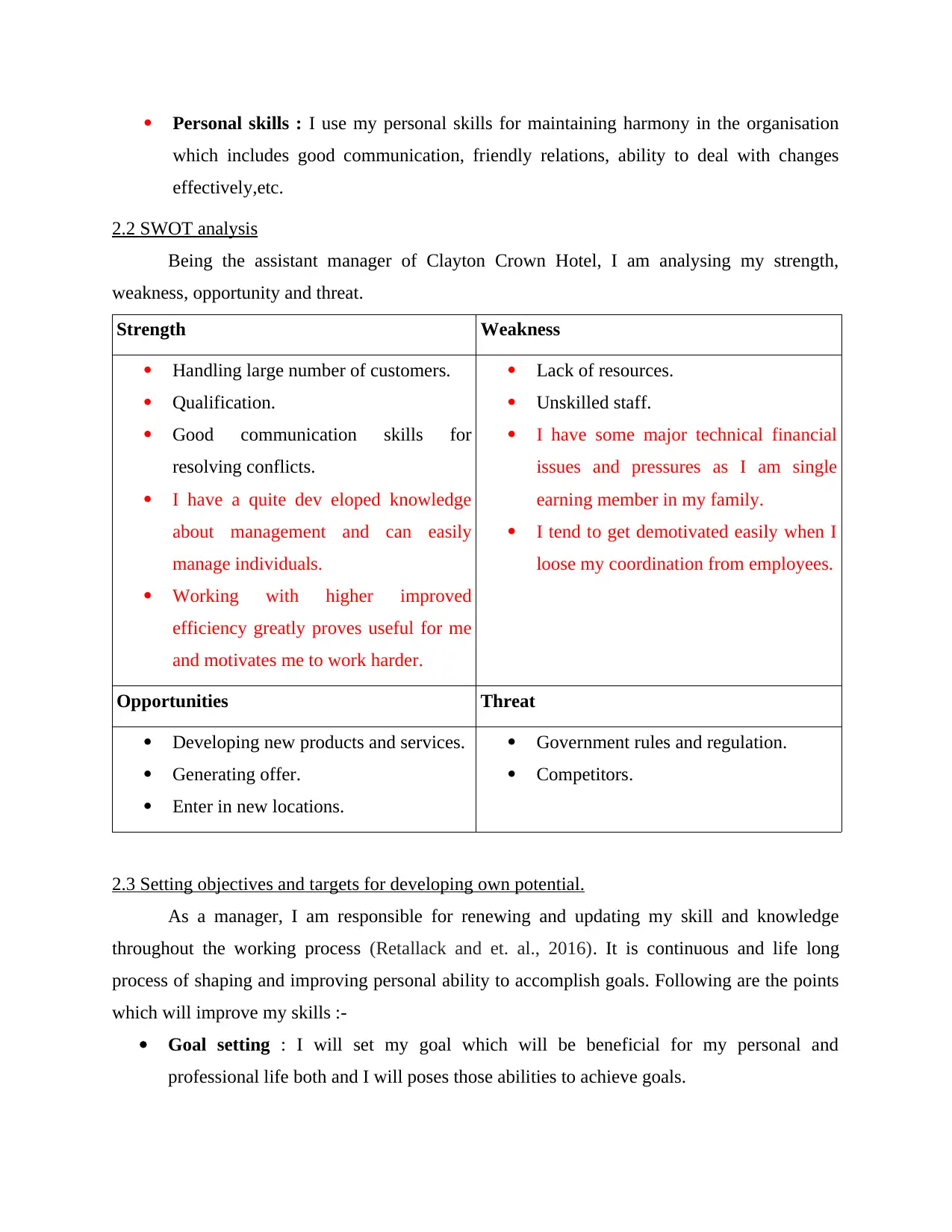
Personal skills : I use my personal skills for maintaining harmony in the organisation
which includes good communication, friendly relations, ability to deal with changes
effectively,etc.
2.2 SWOT analysis
Being the assistant manager of Clayton Crown Hotel, I am analysing my strength,
weakness, opportunity and threat.
Strength Weakness
Handling large number of customers.
Qualification.
Good communication skills for
resolving conflicts.
I have a quite dev eloped knowledge
about management and can easily
manage individuals.
Working with higher improved
efficiency greatly proves useful for me
and motivates me to work harder.
Lack of resources.
Unskilled staff.
I have some major technical financial
issues and pressures as I am single
earning member in my family.
I tend to get demotivated easily when I
loose my coordination from employees.
Opportunities Threat
Developing new products and services.
Generating offer.
Enter in new locations.
Government rules and regulation.
Competitors.
2.3 Setting objectives and targets for developing own potential.
As a manager, I am responsible for renewing and updating my skill and knowledge
throughout the working process (Retallack and et. al., 2016). It is continuous and life long
process of shaping and improving personal ability to accomplish goals. Following are the points
which will improve my skills :-
Goal setting : I will set my goal which will be beneficial for my personal and
professional life both and I will poses those abilities to achieve goals.
which includes good communication, friendly relations, ability to deal with changes
effectively,etc.
2.2 SWOT analysis
Being the assistant manager of Clayton Crown Hotel, I am analysing my strength,
weakness, opportunity and threat.
Strength Weakness
Handling large number of customers.
Qualification.
Good communication skills for
resolving conflicts.
I have a quite dev eloped knowledge
about management and can easily
manage individuals.
Working with higher improved
efficiency greatly proves useful for me
and motivates me to work harder.
Lack of resources.
Unskilled staff.
I have some major technical financial
issues and pressures as I am single
earning member in my family.
I tend to get demotivated easily when I
loose my coordination from employees.
Opportunities Threat
Developing new products and services.
Generating offer.
Enter in new locations.
Government rules and regulation.
Competitors.
2.3 Setting objectives and targets for developing own potential.
As a manager, I am responsible for renewing and updating my skill and knowledge
throughout the working process (Retallack and et. al., 2016). It is continuous and life long
process of shaping and improving personal ability to accomplish goals. Following are the points
which will improve my skills :-
Goal setting : I will set my goal which will be beneficial for my personal and
professional life both and I will poses those abilities to achieve goals.
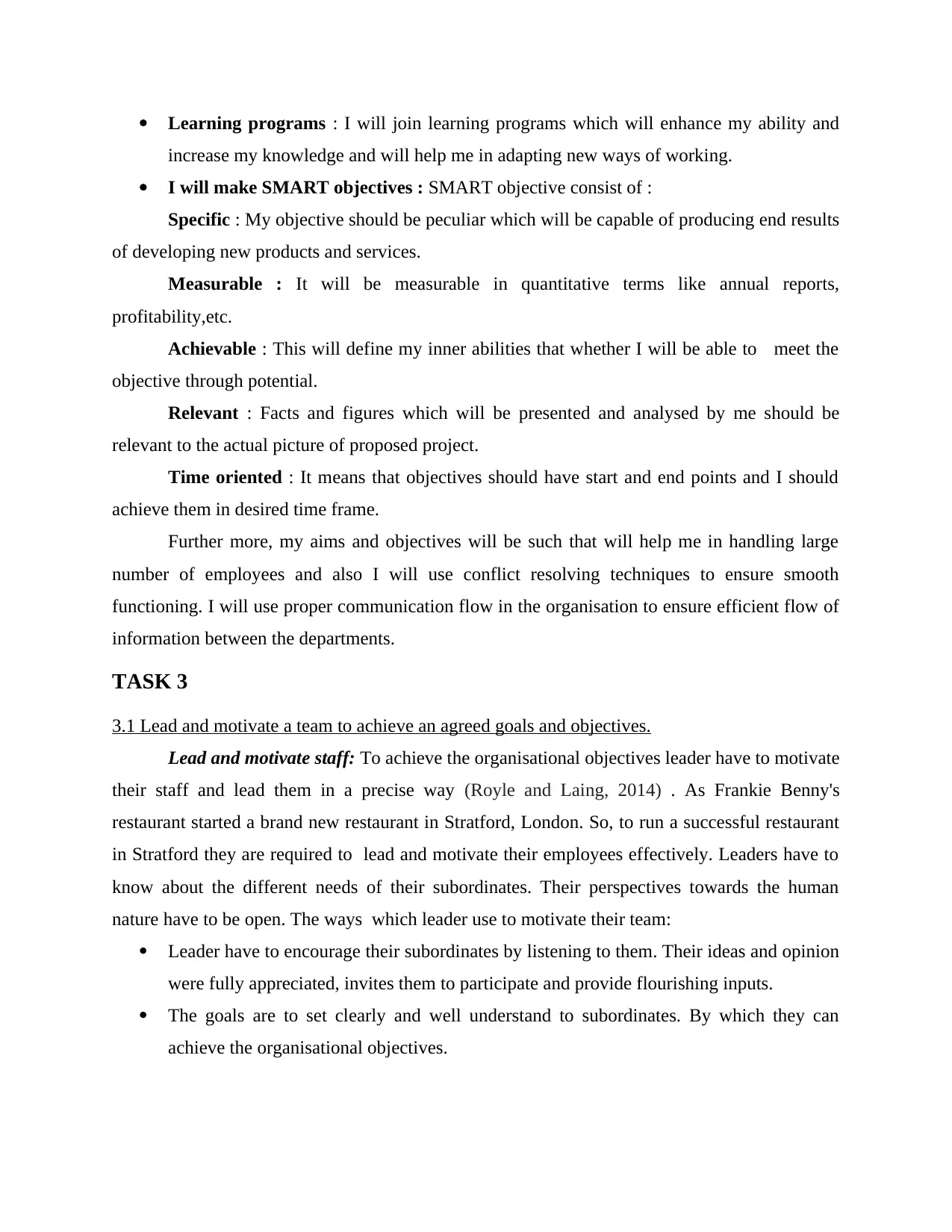
Learning programs : I will join learning programs which will enhance my ability and
increase my knowledge and will help me in adapting new ways of working.
I will make SMART objectives : SMART objective consist of :
Specific : My objective should be peculiar which will be capable of producing end results
of developing new products and services.
Measurable : It will be measurable in quantitative terms like annual reports,
profitability,etc.
Achievable : This will define my inner abilities that whether I will be able to meet the
objective through potential.
Relevant : Facts and figures which will be presented and analysed by me should be
relevant to the actual picture of proposed project.
Time oriented : It means that objectives should have start and end points and I should
achieve them in desired time frame.
Further more, my aims and objectives will be such that will help me in handling large
number of employees and also I will use conflict resolving techniques to ensure smooth
functioning. I will use proper communication flow in the organisation to ensure efficient flow of
information between the departments.
TASK 3
3.1 Lead and motivate a team to achieve an agreed goals and objectives.
Lead and motivate staff: To achieve the organisational objectives leader have to motivate
their staff and lead them in a precise way (Royle and Laing, 2014) . As Frankie Benny's
restaurant started a brand new restaurant in Stratford, London. So, to run a successful restaurant
in Stratford they are required to lead and motivate their employees effectively. Leaders have to
know about the different needs of their subordinates. Their perspectives towards the human
nature have to be open. The ways which leader use to motivate their team:
Leader have to encourage their subordinates by listening to them. Their ideas and opinion
were fully appreciated, invites them to participate and provide flourishing inputs.
The goals are to set clearly and well understand to subordinates. By which they can
achieve the organisational objectives.
increase my knowledge and will help me in adapting new ways of working.
I will make SMART objectives : SMART objective consist of :
Specific : My objective should be peculiar which will be capable of producing end results
of developing new products and services.
Measurable : It will be measurable in quantitative terms like annual reports,
profitability,etc.
Achievable : This will define my inner abilities that whether I will be able to meet the
objective through potential.
Relevant : Facts and figures which will be presented and analysed by me should be
relevant to the actual picture of proposed project.
Time oriented : It means that objectives should have start and end points and I should
achieve them in desired time frame.
Further more, my aims and objectives will be such that will help me in handling large
number of employees and also I will use conflict resolving techniques to ensure smooth
functioning. I will use proper communication flow in the organisation to ensure efficient flow of
information between the departments.
TASK 3
3.1 Lead and motivate a team to achieve an agreed goals and objectives.
Lead and motivate staff: To achieve the organisational objectives leader have to motivate
their staff and lead them in a precise way (Royle and Laing, 2014) . As Frankie Benny's
restaurant started a brand new restaurant in Stratford, London. So, to run a successful restaurant
in Stratford they are required to lead and motivate their employees effectively. Leaders have to
know about the different needs of their subordinates. Their perspectives towards the human
nature have to be open. The ways which leader use to motivate their team:
Leader have to encourage their subordinates by listening to them. Their ideas and opinion
were fully appreciated, invites them to participate and provide flourishing inputs.
The goals are to set clearly and well understand to subordinates. By which they can
achieve the organisational objectives.
⊘ This is a preview!⊘
Do you want full access?
Subscribe today to unlock all pages.

Trusted by 1+ million students worldwide
1 out of 22
Related Documents
Your All-in-One AI-Powered Toolkit for Academic Success.
+13062052269
info@desklib.com
Available 24*7 on WhatsApp / Email
![[object Object]](/_next/static/media/star-bottom.7253800d.svg)
Unlock your academic potential
Copyright © 2020–2026 A2Z Services. All Rights Reserved. Developed and managed by ZUCOL.





